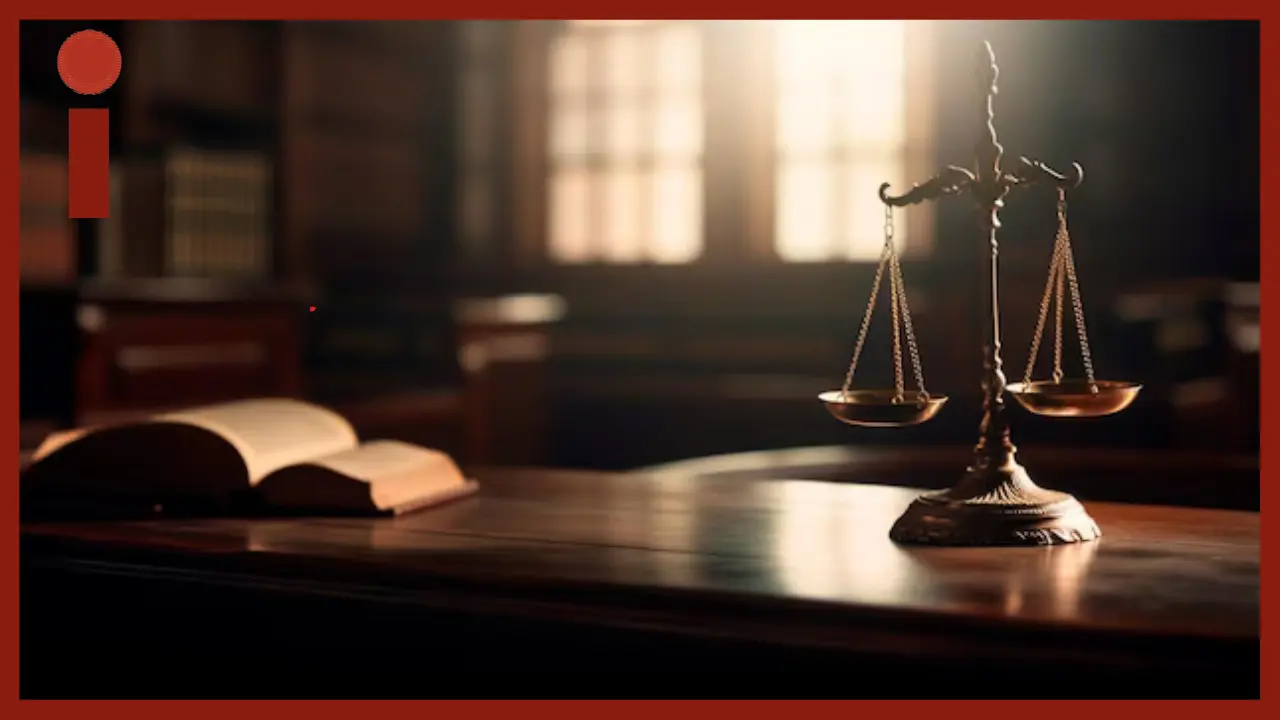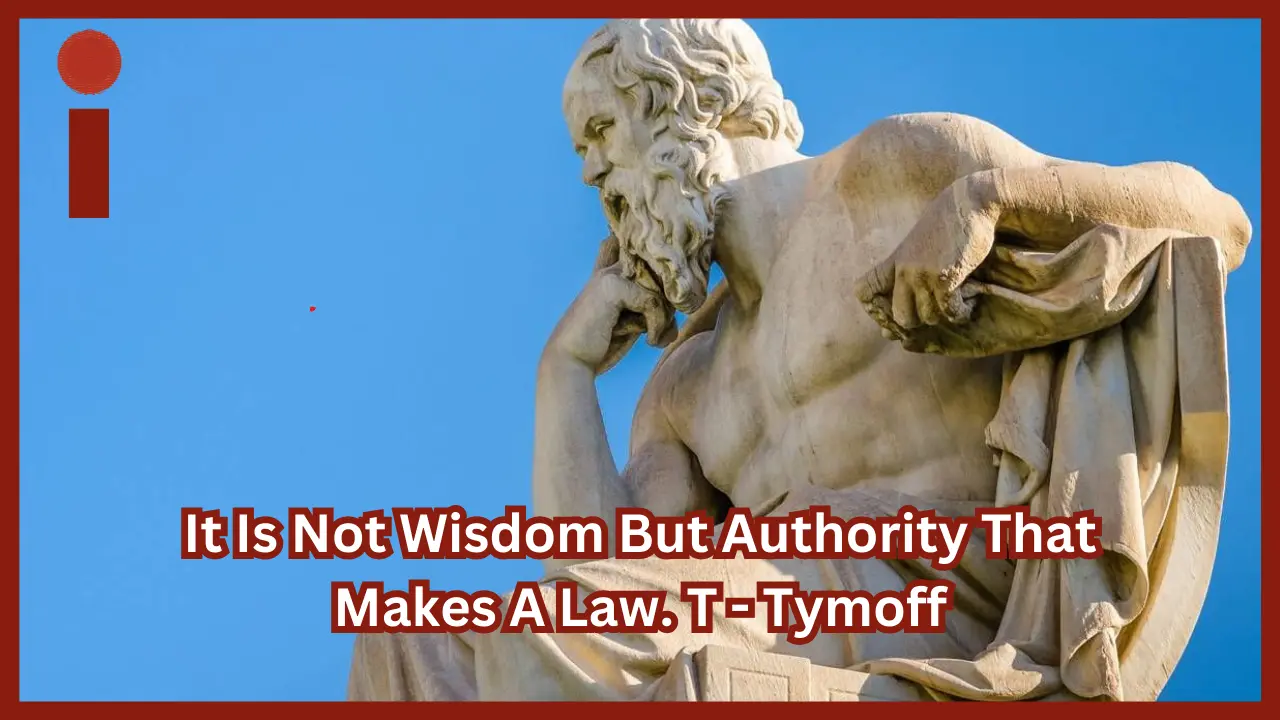The quote “it is not wisdom but authority that makes a law. t – tymoff,” by T. Tymoff touches on one of the most significant issues in the creation of laws. It highlights the ongoing struggle between two fundamental forces: wisdom and authority. While wisdom speaks to the knowledge and moral considerations behind the laws, authority refers to the power that legitimizes and enforces them. But which of the two is more crucial for making and maintaining laws?
At first glance, wisdom may seem like the cornerstone of any just law. After all, laws ought to be grounded in morality and reason, reflecting the values of a fair and ethical society. However, as Tymoff points out, wisdom alone does not create or uphold the law. It is not wisdom but authority that makes a law, ensuring that these rules are enforceable and maintain order within a community. Without the power to back them up, even the wisest laws remain ineffective.
This observation raises essential questions about the nature of law and governance. How does authority without wisdom shape a society? Is wisdom still relevant if it cannot manifest into enforceable laws? This article aims to delve into the complex relationship between wisdom and authority in lawmaking, dissecting the implications of Tymoff’s thought-provoking statement. We will explore how these forces interplay in democratic and authoritarian regimes, examine how societies balance them, and assess their long-term impact on justice and governance.
The Role of Authority in Lawmaking
Authority as the Bedrock of Law
When Tymoff claims that “it is not wisdom but authority that makes a law. t – tymoff,” he underscores the pivotal role of authority in the lawmaking process. Authority, as the entity responsible for creating, enforcing, and interpreting laws, forms the bedrock of any legal system. In most political frameworks, laws are established by individuals or institutions with legal authority, such as governments or legislative bodies. These entities hold the power to impose rules that citizens must follow, regardless of whether the laws are rooted in wisdom.
Authority gives laws their power. Without the force of authority, even the most morally sound and rational laws would remain theoretical. In essence, laws would only be advisory guidelines without the means to enforce them. This makes authority indispensable to maintaining order, and Tymoff’s assertion that “it is not wisdom but authority that makes a law” highlights the reality that lawmaking is more about exercising power than it is about pursuing intellectual or ethical ideals.
The Enforcement of Authority
Once a law is established, its efficacy depends on its enforcement. Authority ensures that laws are followed through the deployment of policing, the judicial system, and the imposition of penalties. The act of enforcing laws is perhaps the clearest example of how authority functions as the primary engine behind any legal system.
Without enforcement, a law is merely an idea. It is authority that transforms this idea into something tangible, compelling individuals to adhere to the rule. However, the overreliance on authority, devoid of wisdom, can lead to unjust outcomes. For example, regimes that enforce laws without considering ethical implications may create an oppressive atmosphere where people comply out of fear, rather than a shared sense of justice.
This is where Tymoff’s quote, “it is not wisdom but authority that makes a law. t – tymoff,” becomes both a warning and a reflection. Authority may maintain order, but unchecked authority can also suppress wisdom and justice.
Authoritarianism and the Consequences of Absolute Authority
In authoritarian regimes, the concept that “it is not wisdom but authority that makes a law. t – tymoff” is most clearly demonstrated. Laws in these systems are often established and enforced with little regard for public input or moral considerations. Instead, they are driven by the ruling authority’s desire to maintain control and power. The result is a legal system where laws may lack wisdom and justice but are strictly enforced due to the absolute nature of authority.
Such regimes can highlight the dangers Tymoff implies when authority outweighs wisdom. Laws in authoritarian governments often reflect the desires of those in power, not the needs or well-being of the population. Despite this, these laws are effective in the short term because they are backed by authority. Over time, however, such systems may give rise to unrest and rebellion, as citizens may eventually reject laws that lack wisdom and moral standing.
The Role of Wisdom in Lawmaking
Wisdom: The Moral Compass of Society
While Tymoff emphasizes the power of authority in lawmaking, wisdom cannot be entirely discounted. Wisdom encompasses the knowledge, experience, and ethical considerations that guide the creation of laws. In an ideal society, laws would be shaped by wisdom, reflecting justice, fairness, and the greater good. A wise law considers not only the present conditions but also the long-term impacts on society.
Wisdom in lawmaking is essential for promoting human rights, protecting vulnerable populations, and fostering a sense of collective well-being. When we think about the best laws in history, they are often the ones that reflect a deep understanding of human nature and social dynamics. However, as Tymoff points out, it is not wisdom but authority that makes a law—meaning wisdom alone is not enough to ensure laws are created and upheld. Laws must be enforceable, and for that, they require the backing of authority.
Judicial Wisdom: Courts and Precedents
One of the areas where wisdom plays a significant role in law is in the judicial system. Judges apply accumulated wisdom when interpreting and applying laws, ensuring that legal rulings are just and consistent with societal values. Through the development of legal precedents, courts reflect wisdom by building upon past decisions to maintain fairness and consistency.
This form of judicial wisdom can serve as a counterbalance to authority, preventing the misuse of power and ensuring that laws are applied fairly. Legal precedents, particularly in democratic societies, ensure that wisdom is not entirely overshadowed by authority. However, even in these cases, Tymoff’s assertion that “it is not wisdom but authority that makes a law. t – tymoff” holds, as judicial rulings are only enforceable through the authority of the courts and legal institutions.
Public Wisdom: The Voice of the People
In democratic societies, wisdom is often derived from the public. Elections, referenda, and public consultations allow citizens to have a say in the lawmaking process. This collective wisdom, or public opinion, provides a moral and ethical compass that can guide the creation of laws.
By allowing citizens to participate in governance, democratic systems strive to ensure that laws reflect the wisdom of the populace. However, even in democracies, it remains true that “it is not wisdom but authority that makes a law. t – tymoff”. Public wisdom may guide lawmakers, but laws still require the authority of the government to be implemented and enforced.
Balancing Wisdom and Authority in Lawmaking

The Importance of Balance
The tension between wisdom and authority in lawmaking is ever-present. As Tymoff asserts, authority is necessary to create and enforce laws, but wisdom is what gives those laws their moral foundation. A well-functioning society must strike a balance between these two forces. While authority is needed to maintain order, wisdom ensures that the laws enacted are just, fair, and reflective of the greater good.
If authority is exercised without wisdom, laws can become tools of oppression. On the other hand, wisdom without authority results in laws that, while morally right, are unenforceable. Therefore, achieving a balance between these forces is crucial for any society that aspires to be both orderly and just.
Mechanisms for Achieving Balance
In democratic systems, various mechanisms exist to ensure a balance between wisdom and authority. The separation of powers, for instance, ensures that no single entity has absolute control over lawmaking, law enforcement, and judicial interpretation. The executive, legislative, and judicial branches each play a role in balancing wisdom and authority.
In addition, democratic societies allow for the periodic revision of laws. This adaptability ensures that laws can evolve in response to changing societal needs, incorporating new wisdom while remaining enforceable through the backing of authority. This balance, while imperfect, ensures that both wisdom and authority play vital roles in governance.
The Role of Ethical Leadership
Ethical leadership is also crucial in maintaining the balance between wisdom and authority. Leaders who prioritize the well-being of their citizens can bridge the gap between these two forces, ensuring that laws reflect both ethical principles and enforceable power.
Ethical leaders use their authority wisely, making decisions that are grounded in justice, fairness, and the collective good. They foster trust within their communities by being transparent, engaging with citizens, and ensuring that the laws they enact serve the greater interest. This form of leadership is essential in ensuring that authority does not overshadow wisdom in the lawmaking process.
The Consequences of Ignoring Wisdom
Laws Without Wisdom: A Path to Tyranny
Tymoff’s assertion, “it is not wisdom but authority that makes a law. t – tymoff,” serves as a reminder of the dangers that arise when authority is exercised without wisdom. History has shown that laws created solely to maintain power can lead to oppression and tyranny. Such laws often serve the interests of the ruling elite rather than the needs of the general population.
In the absence of wisdom, laws can be arbitrary and discriminatory, leading to social unrest and resistance. Authoritarian regimes that prioritize authority over wisdom often face rebellion and civil disobedience as citizens push back against unjust laws. While authority may provide short-term stability, wisdom is essential for long-term peace and prosperity.
The Collapse of Authority Without Wisdom
When authority is not tempered by wisdom, it can eventually collapse. A regime that relies solely on the power of authority to enforce laws without considering their wisdom will eventually face challenges from within. This is because laws that lack justice and fairness cannot gain the respect of the people. Over time, citizens may revolt against such laws, leading to the eventual downfall of the regime.
Conclusion
Tymoff’s statement, “it is not wisdom but authority that makes a law. t – tymoff,” provides a powerful lens through which we can examine the nature of lawmaking. Authority is undeniably essential for creating and enforcing laws, but wisdom is equally crucial for ensuring those laws are just and beneficial to society.
While it is authority that makes a law, it is wisdom that gives a law its moral weight. In a well-functioning society, these two forces must coexist and balance each other. Laws that are backed by authority without wisdom can lead to tyranny and oppression, while wisdom without authority results in unenforceable ideals.
The challenge for any society lies in striking the right balance between wisdom and authority. By ensuring that authority is exercised with wisdom and that laws reflect both the power to enforce and the moral imperative to do good, societies can hope to create legal systems that are not only functional but also just and equitable.
FAQs
What does Tymoff’s statement mean?
Tymoff’s assertion highlights the idea that while wisdom may guide moral judgments, it is authority that ultimately enforces laws and gives them legitimacy.
Why is authority necessary in lawmaking?
Authority is necessary because, without it, laws would not be enforced. Authority ensures compliance and order within a society.
Can a law be just without wisdom?
While authority can make a law enforceable, laws lacking wisdom may be unjust, leading to social discontent and instability.
How do democratic systems balance wisdom and authority?
Democratic systems balance wisdom and authority through public participation, checks and balances, and judicial oversight, ensuring that laws reflect societal values while maintaining enforceability.
What are the dangers of prioritizing authority over wisdom?
Prioritizing authority over wisdom can lead to oppressive laws that serve the interests of a few rather than promoting justice and equity.
How can wisdom be incorporated into the lawmaking process?
Wisdom can be incorporated through public consultations, expert opinions, and judicial interpretation, ensuring that laws are just and reflect societal values.




